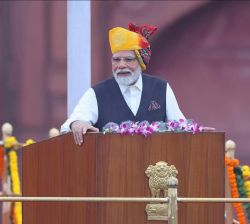Narendra Modi

| |
| Prime Minister Narendra Modi | |
| Born | 17 September 1950 (age 75) Vadnagar, Bombay State, India (now Gujarat) |
|---|---|
| Nationality | Indian |
| Education | MA (Political Science) |
| Alma mater | Gujarat University |
| Occupation | Politician |
| Years active | 1971 – present |
| Known for | Prime Minister of India, BJP leader |
| Notable works | |
| Awards | |
| Spouse(s) | Jashodaben Modi |
| Parents | Damodardas Mulchand Modi (father) Heeraben Modi (mother) |
| Religion | Hinduism |
| Website | pmindia.gov.in |
Narendra Modi is an Indian politician and the 14th Prime Minister of India. Modi, a prominent figure in the "Bharatiya Janata Party (BJP)," is renowned for his strong leadership, economic reforms, and nationalist persona. After leading his party to a historic victory, he was first elected prime minister in 2014. He was re-elected in 2019 and won a third term in 2024 while leading the BJP-led NDA alliance.
Early Life & Education
Narendra Damodardas Modi was born on September 17, 1950, in Vadnagar, a small town in Gujarat. He was raised in a modest household and assisted his father in selling tea at a train station. He graduated from Gujarat University with a master's degree in political science.
Early in the 1970s, Modi became a member of the nationalist "Rashtriya Swayamsevak Sangh (RSS)" and later founded the "Akhil Bharatiya Vidyarthi Parishad (ABVP)," the RSS's student wing. His leadership style and political beliefs were influenced by his early affiliation with RSS.
Career
Early Political Career
In 1987, Modi officially joined the Bharatiya Janata Party (BJP). Within a year, he became the General Secretary of the Gujarat BJP unit and played a crucial role in strengthening the party’s base across the state. By the mid-1990s, he had risen through the ranks, working in the BJP’s national organization in New Delhi. In 2001, following the Bhuj earthquake and internal party challenges, Modi replaced Keshubhai Patel as the Chief Minister of Gujarat.
Chief Minister of Gujarat (2001–2014)
Modi’s tenure as Chief Minister was marked by both development and controversy. His leadership during the 2002 Gujarat riots drew international criticism, but his administration later focused on industrial growth, infrastructure, and governance reforms.
Under his leadership, Gujarat became one of India’s fastest-growing states, earning him a reputation as a pro-development leader. The BJP, under his command, won three consecutive state elections—in 2002, 2007, and 2012.
Premiership of Narendra Modi
First Term (2014–2019)
In the 2014 general elections, Modi led the BJP to a landmark victory, ending decades of Congress dominance. His government introduced major reforms like:
- Swachh Bharat Abhiyan (Clean India Mission)
- Make in India and Digital India initiatives
- Liberalization of foreign investment
- Introduction of the Goods and Services Tax (GST)
- Demonetization of ₹500 and ₹1,000 notes (2016)
Despite initial criticism, Modi strengthened India’s global image and foreign relations, notably with the U.S. and Japan.
Second Term (2019–2024)
Modi’s second term saw historic decisions, including the revocation of Jammu and Kashmir’s special status (Article 370) and the passage of the Citizenship Amendment Act (CAA). His government also led India’s response to the COVID-19 pandemic and promoted domestic vaccine production under the “Vaccine Maitri” initiative. However, the controversial farm laws sparked massive farmer protests, which were eventually repealed in 2021.
Third Term (2024–Present)
In the 2024 Lok Sabha elections, the BJP-led NDA alliance won 293 of 543 seats, securing Modi’s third term as Prime Minister. Although the BJP fell short of a majority on its own, Modi continues to lead the coalition government. His tenure has focused on technology, infrastructure expansion, and national security.
Major Policies & Initiatives
- Swachh Bharat Abhiyan
- Digital India
- Make in India
- Atmanirbhar Bharat (Self-Reliant India)
- Ayushman Bharat – National Health Protection Scheme
- PM-KISAN and Jan Dhan Yojana
- Smart Cities Mission
- Ujjwala Yojana
Achievements & Recognition
- Named among the world’s most powerful people by Forbes multiple times
- Honored with the Seoul Peace Prize (2018)
- Awarded the UN Champions of the Earth Award (2018) for environmental leadership
- Led India to the global stage as the 5th largest economy
Ram Mandir & Cultural Legacy
One of Modi’s key achievements has been the construction of the Ram Mandir in Ayodhya, fulfilling a long-standing BJP promise. The consecration ceremony took place on January 22, 2024, symbolizing a major cultural and political milestone in India’s history.
Notable Works
- “Exam Warriors” (book for students)
- “Convenient Action: Gujarat’s Response to Challenges of Climate Change”
- “A Journey: Poems by Narendra Modi”
